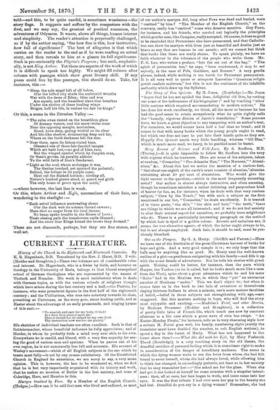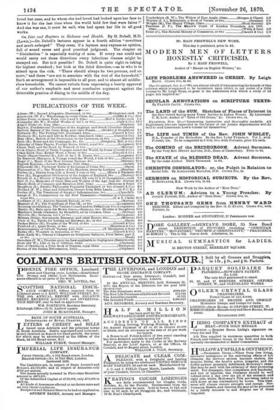boys and girls. And a very good sample it is
; we only hope that the
bulk may be anything like as good. Mr. Henty uses the well-known outline of a plot—a gentleman emigrating with his family—and fills it up
with the usual details of adventures. But he tells his stories with great
spirit. Nothing could be better, for instance, than the yarn which Harper, the Yankee (so he is called, but he looks much more like a man
from the West), spins about a great adventure which he and his mate "Rube" had in the Mexican war, in which they "put" an enormous number of Mexicans "under." This we don't object to ; but when it
comes later on in the book to two lads of seventeen or thereabouts slaying thirteen Indians in about a minute, one's more mature faculties of belief,—belief in these subjects not strengthening with age,—aro staggered. But this matters nothing to boys, who will find the story most enjoyable and exciting.—Madeline's Trial, and other Stories, by Madame Pressens6 (EIodder and Stoughton), is a collection of pretty little tales of French life, which touch one now by constant
allusions to a life over which a great wave of ruin has swept. "An
Easter-Monday Picnic," for instance, tells us in very charming style how a certain M. Portal goes with his family, numbering eight (surely the
translator must have doubled the number, to suit English notions), to
spend a day in the forest of Marly. What has not happened to the forest since then ?— What She did with her Life, by Mary Fosbrook
Theed (Routledge), is a very touching story on the old theme, the dreadful sacrifice of personal feeling which it is sometimes right to make in consideration of the danger of hereditary madness. The scene in which the dying woman waits to see the lover from whom she had felt bound to sever herself, whom she had always loved, while allowing him to think her changed, is exceedingly pathetic, not least so in her anxiety that he may remember her:—" She asked me for the glass. When she had got it she looked at herself for some minutes with a singular intent- ness: then, all at once, her face began to work, and tears came into her eyes. It was the first tribute I had ever seen her pay to the beauty she had lost. Dreadful do you say in a dying woman? Remember, she had loved but once, and he whom she had loved had looked upon her face to know it for the last time when the world held few that were fairer!' And she was one, it mast be said, who had spent her life in all good works.



































 Previous page
Previous page